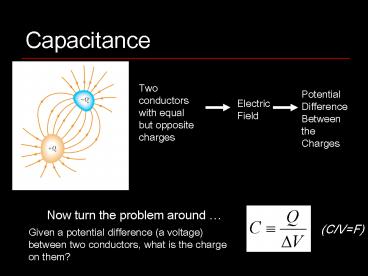Capacitance - PowerPoint PPT Presentation
1 / 29
Title:
Capacitance
Description:
A parallel-plate capacitor is attached to a battery that maintains a constant potential difference V between the plates. While the battery is still connected, ... – PowerPoint PPT presentation
Number of Views:290
Avg rating:3.0/5.0
Title: Capacitance
1
Capacitance
Two conductors with equal but opposite charges
Potential Difference Between the Charges
Electric Field
Now turn the problem around
Given a potential difference (a voltage) between
two conductors, what is the charge on them?
2
Announcements
- Cell phones on silent.
3
Purpose of capacitors
- Mainly as a reservoir of charge.
- About 2 timing or frequency control.
4
Calculating Capacitance
Assume a charge q on the plates
Calculate the e-field using Gauss Law
Calculate the potential
Find the capacitance
5
Parallel Plate Capacitor
Find electric field for the above using Gausss
Law.
6
Parallel Plate Capacitor
Increased area results in increased charge
storage for a constant voltage.
Capacitance is proportional to area
7
Parallel Plate Capacitor
The potential difference between the battery
terminals and the plates will create a field and
charges will flow from the battery to the plates
until the potential difference is zeroed.
Capacitance is inversely proportional to the
distance between the plates.
8
Parallel Plate Capacitor
Surface charge density on the plates
The field (assuming dltltA1/2)
The potential difference
The capacitance
9
Cylindrical Capacitor
10
Spherical Capacitor
11
Announcements
- Cell phones on silent.
- Test September 18.
- Covers chapters 23 26.
- Multiple choice concept tests problems.
- Cut up answer sheets and bring to all classes.
12
Circuits with Capacitors
- A battery drives charges to accumulate on the
capacitor plates. - A switch controls the flow of charge.
Derive series, parallel formulae on board.
13
Parallel Combination
For parallel capacitors
14
Parallel Connections
All are parallel connections
This is not
15
Series Combination
For series capacitors
16
Series and Parallel
- Consider circuit on board.
- 1. Name all pairs of capacitors in series.
- 2. Name all pairs of capacitors in series.
- Key ideas
- For capacitors in series, the charges are all the
same. - For capacitors in parallel, the potential
differences are all the same.
17
Mixed Combination of Capacitors
18
Find the capacitance
19
Energy Stored in a Capacitor
- Since capacitors can carry charge after a battery
is disconnected, they can store energy. - To calculate this energy, consider the work done
to move a small amount of charge from one plate
of the capacitor to the other. - As more and more charges are moved, the work
required increases.
20
Concept Question
Consider a simple parallel-plate capacitor whose
plates are given equal and opposite charges and
are separated by a distance d. Suppose the plates
are pulled apart until they are separated by a
distance D gt d. The electrostatic energy stored
in the capacitor is 1. greater than 2. the same
as 3. smaller than before the plates were pulled
apart.
21
Energy Density
- Defined as stored energy per unit volume.
- Consider the parallel plate capacitor.
22
Rewiring Two Charged Capacitors
23
Dielectrics
- Dielectrics are insulators like glass, rubber or
wood. - They are used to increase the charge storage
capacity and maximum voltage in capacitors while
providing mechanical support. - They are characterized by a dielectric constant,
k, and are limited by the dielectric strength.
24
Capacitors With Dielectrics
25
An Atomic View
- As we apply a voltage to the plates, the
dielectric in between is polarized. - This creates a field in the opposite direction to
the applied field and therefore reduces the
effective voltage.
26
Concept Question
A parallel-plate capacitor is attached to a
battery that maintains a constant potential
difference V between the plates. While the
battery is still connected, a glass slab is
inserted so as to just fill the space between the
plates. The stored energy 1. increases. 2.
decreases. 3. remains the same.
27
Metallic Slab Inside a Capacitor
28
Summary
- Capacitors are geometries that can hold charges.
- Use Gauss Law symmetries to calculate
capacitance. - Series and parallel connections.
- Dielectrics increase capacitance.
29
For Next Class
- Reading Assignment
- Chapter 27 Current and Resistance
- WebAssign Assignment 4































